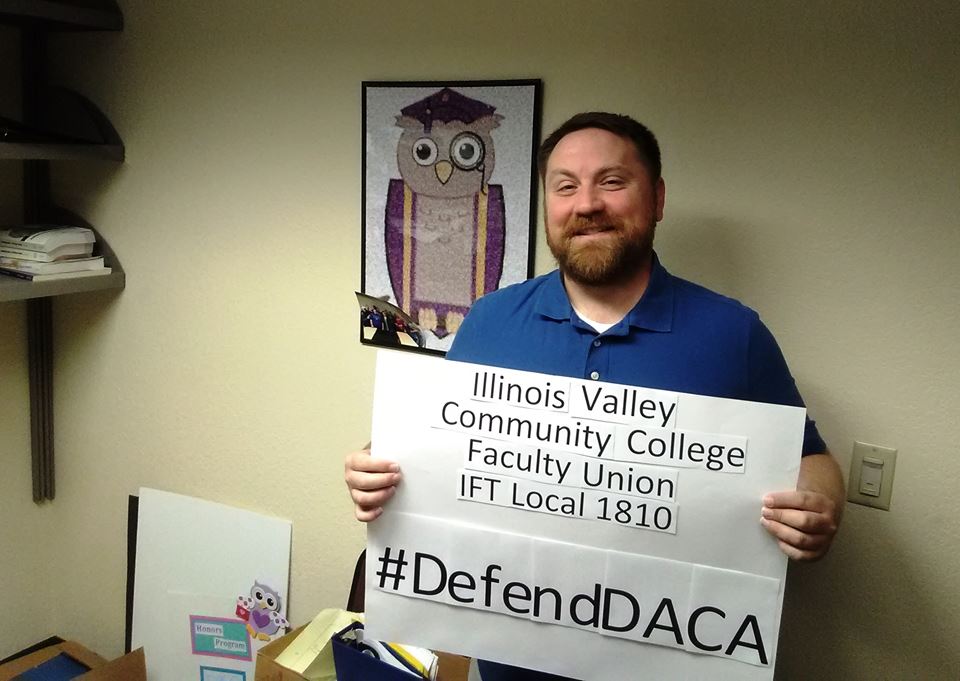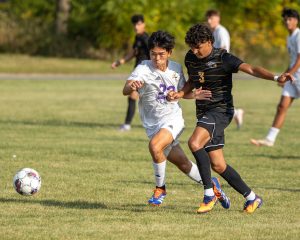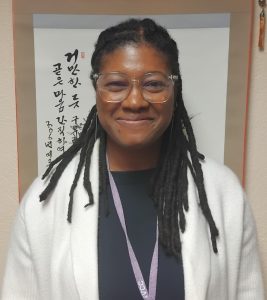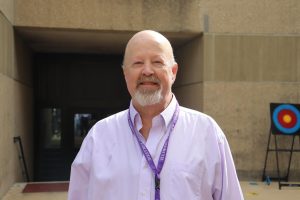DACA gives student new life
Show of Support: Adam Oldaker, English instructor, and several members of IFT Local 1810 shared pictures on social media to show support for DACA.
September 21, 2017
An IVCC student shared her early childhood experience of crossing the border between Mexico and the United States in escape of her verbally and physically abusive father. She asked to remain anonymous.
Her mother was not unlike other women in Mexico. She married a man whom she loved, and had three children with him. The marriage began as a happy one, but over its course, turned extremely dangerous. Her husband began to verbally and physically abuse her. As a mother, she grew extremely fearful of not only her own fate, but also her children’s fate.
In her last hope of a good life, she took the opportunity. While her husband was not around, she took a few possessions and her one-year-old daughter in her arms, along with her nine- and ten-year-old daughters by her side. They left and would illegally cross the border of Mexico with help from hired “coyotes.”
The student explained that crossing the border was the hardest part for her because she did not know if she would ever see her mother again. She knew that many mothers were separated from their children while crossing the border, and some never reconnect again. Even though this separation was extremely risky, it was also a necessary action for the family to remain under the radar in their attempt at crossing.
When women are plotting to cross the border without permission from their husbands or a lot of money, they must do so illegally. This becomes a dangerous situation because in order to cross, they must have faith in hired “coyotes” to get them to where they are going.
They have no guaranteed protection, which is why some families are broken apart. According to the student, “Some children and mothers disappear and are sold for their body parts.”
Crossing the border was risky.
“The coyotes told us to run as fast as we could. And they had previously put a belt on us. We ran until we saw a taxi and we got in it and took our belt off, which had an address on the back of it. This was the address where we were reunited in a cheap hotel room after crossing into the U.S.,” the student explained.
The student, her mother and her two sisters were finally together again in their new world. This was a relief of its own, but according to the student, challenges seemed to continually arise.
Once in the United States, she was forced to learn English. Prior to their crossing, she notes that they had, “zero knowledge of the language.”
Luckily, she had an aunt in the states who could help.
“In the area, there were not many Latinos. During that time, there weren’t teachers that spoke Spanish either that we could find to help us,” the student said.
After she had begun to pick up on the English language and enrolled back into school, she notes that her challenges continued to come. In school, the student remembers being bullied for having a “heavy accent.” She recalls remaining silent throughout the school day in fear of being bullied.
Finally, she was able to face those school kids and continue to pursue her learning of the English language. Because of her efforts, she put an end to the bullying. She credits her aunt in being “the person who helped her overcome her fear of speaking.”
The entire family has grown inseparable with their experiences together, and they are now safe.
The family lives a better life here in America because they are not property, she said. They now have rights and freedoms. They now are bilingual, have degrees and jobs. The student can speak confidently in English and in Spanish and lives just like any other dweller in the United States.
In recent events, the family’s residency has been put into question, and because of this reason, the student’s story is even more important to share.
The Deferred Action for Childhood Arrivals (DACA), which was an act established under the Obama administration in June 2012, has been repealed. President Trump has different opinions about American immigration policy, and because of this, has been making headlines for his desire to eliminate DACA.
As of this year, 800,000 people were enrolled in the program. Under DACA, any person who was brought into this country as a child, and who is considered an illegal under the program, is guaranteed a certain number of years without being deported.
They are protected under DACA and have the right to work, attend school and live the American life.
If this plan is eliminated, many families will be broken up. College graduates would lose the jobs that they earned and would be forced to put an end to their dreams and begin again somewhere else.
Currently, there is no legal path to citizenship for those who enter the country illegally. Without a legal path to take, the “dreamers” have no voice in their future and must continue to rely on the voices of others.
IVCC president Jerry Corcoran did not reply to a request for comment on DACA as of press time.




